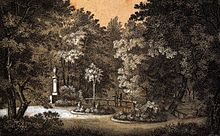Friedrich IV. (Saxe-Gotha-Altenburg)

Friedrich IV of Saxe-Gotha-Altenburg (born November 28, 1774 in Gotha ; † February 11, 1825 there ) was the last Duke of Saxe-Gotha-Altenburg .
Life
Friedrich IV was the third son of Duke Ernst II of Saxe-Gotha-Altenburg (1745–1804) from his marriage to Charlotte (1751–1827), daughter of Duke Anton Ulrich of Saxe-Meiningen . Between 1788 and 1790 he was trained together with his older brother August in Geneva. Friedrich studied philosophy, constitutional law and history. In contrast to his brother, he was considered humble, good-natured and close to the people. The prince was an admired singer.
As the younger son of his father, Friedrich was destined for military service and in 1785 he was given to the Dutch army as a colonel. He fought in the campaigns against revolutionary France and was seriously wounded in 1793 by an overturning powder wagon. As a result of this wounding, he suffered a condition that forced him to spend much of his life in medicinal baths and from which he eventually died.
From 1804 to 1810 Friedrich lived in Rome. Pope Pius VII gave him a miniature obelisk; In 1814 he was the only one in the history of his house in Italy to convert to the Roman Catholic Church . The stay in Rome had significantly improved his health.
Friedrich had a strong interest in Egypt and the Orient; he was the main sponsor of Ulrich Jasper Seetzen's trips to the Orient . His works of art and antiquities, which he collected in Italy, are now part of the Schloss Friedenstein collection .
Since his older brother, Duke August , died in 1822 without male heirs, he took over the government of the duchy as Friedrich IV. Because of his illness, he stayed outside his country for a long time on spa stays and hardly ruled himself. His privy councilor Bernhard August von Lindenau led the government for him . In the last years of his life he had almost completely lost his ability to speak and was only able to communicate with others through gestures. Because of his change of faith, all religious questions in the country were the responsibility of Friedrich's ministry. During the reign of Frederick IV, the court, the page institute and the bodyguard were dissolved.
Only three years after taking office, Duke Friedrich IV died childless. Because he had been denied appropriate allowance , he had never married. With him the House of Saxe-Gotha-Altenburg went out. The territory fell to the Ernestine relatives and was partly part of the newly established Duchy of Saxe-Coburg and Gotha .
Friedrich IV. Was buried - like his father Ernst II. And his brother August - on the island in the large park pond of Gotha Castle Park . It rests in the subterranean crypt built by the architect Carl Christoph Besser in 1779 next to his brothers Ludwig (died 1777) and Ernst (died 1779), who died in childhood. The granite column that once adorned the crypt with an urn made of Carrara marble and a base from Serpentino antico by the sculptor Friedrich Wilhelm Doell has not existed for decades, so that the exact location of Friedrich IV's burial place on the island is now unknown.
Individual evidence
- ↑ Richard Waitz: The ducal park of Gotha from its creation to the present time , Gotha 1849, p. 15 f.
- ↑ August Beck: Ernst the Second, Duke of Saxe-Gotha and Altenburg, as carer and protector of science and art , Gotha 1854, p. 226.
literature
- August Beck : Friedrich IV., Duke of Saxe-Gotha and Altenburg . In: Allgemeine Deutsche Biographie (ADB). Volume 8, Duncker & Humblot, Leipzig 1878, p. 6 f.
| predecessor | Office | successor |
|---|---|---|
| August |
Duke of Saxe-Gotha-Altenburg 1822 - 1825 |
- |
| personal data | |
|---|---|
| SURNAME | Friedrich IV. |
| ALTERNATIVE NAMES | Friedrich IV of Saxe-Gotha-Altenburg |
| BRIEF DESCRIPTION | Duke of Saxe-Gotha and Altenburg (1822–1825) |
| DATE OF BIRTH | November 28, 1774 |
| PLACE OF BIRTH | Gotha , Duchy of Saxe-Gotha and Altenburg , Holy Roman Empire |
| DATE OF DEATH | February 11, 1825 |
| Place of death | Gotha , Duchy of Saxe-Gotha and Altenburg |
